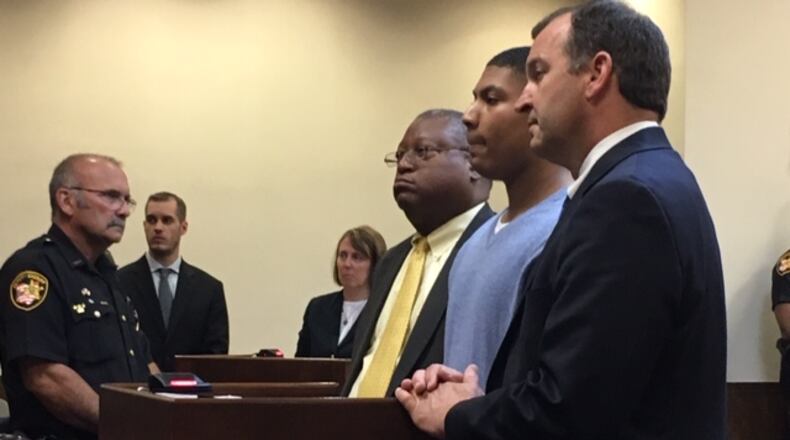“We’re going to look at all legal avenues” in filing an appeal in the case, Swift said.
POPULAR: Ruling sends Kettering teen in fatal shooting to court that sentenced him to prison
Gregory, 19, has been in juvenile detention since shortly after the Sept. 4, 2016, shooting of Bowers on Willowdale Avenue in Kettering, where both then-16-year-olds were after their separate groups left AlterFest.
“The time he’s been in juvenile detention he’s remained relatively problem free,” Swift said. “He’s demonstrated he can be rehabilitated in the juvenile system.”
The case returned to juvenile court because Gregory was not convicted of murder, a charge that initially prompted the transfer to adult court. Keeping the case in the juvenile system would have freed Gregory in March of 2021, when he turns 21.
But Montgomery County Juvenile Court Judge Anthony Capizzi said in his ruling Wednesday “the defendant is not amenable to care or rehabilitation within the juvenile justice system. Further, this court finds that the safety of the community necessitates defendant being subjected solely to adult sanctions.”
RELATED: How Kettering teen came to be tried as adult and what took case 2 years to go to trial
Capizzi’s 13-page ruling considered nine factors in favor of a transfer, according to court records. Seven were found to favor transfer and two were “strongly in favor.” Those two factors were:
•The results of any previous juvenile sanctions and programs indicate that rehabilitation of the child will not occur in the juvenile system.
• There is not sufficient time to rehabilitate the child within the juvenile system.
The judge’s ruling also considered eight factors against a transfer. Seven, he found, do “not weigh against” while the other was a neutral finding.
Bowers’ mother, Jessica Combs, said she was glad the case is returning to adult court, but called the sentence “a slap on the wrist.”
EARLIER: Doctors paint different pictures of accused Kettering teen killer
Combs pleaded with the adult court judge for the maximum prison sentence, which was 41 years. The prosecution sought no less than 35 years.
Since Nov. 1, 2012, this case is among a few in Montgomery County juvenile court that have been bound over to adult court, then returned to juvenile court before being sent again to adult court, juvenile Court Administrator Eric Shafer said.
Given the unique nature of the case, the appeals options for it are not commonly known, Shafer said.
Based on his understanding, Shafer said if defense appeals, it would likely be related to the adult court sentence or the imposition of the sentence.
Shafer said he doesn’t think Capizzi’s ruling would be subject to an appeal because it served to “move the case along” and was not a final step.
RELATED: ‘Quirky’ law may return Kettering teen shooting death case to juvenile court
The shooting was Kettering’s first gun-related homicide since 2007. It followed an earlier dispute at AlterFest that involved neither the defendant nor the victim, court witnesses said.
Bowers was with three friends at AlterFest when they were approached by a group that included Gregory — who said he was armed with a stolen, loaded gun — and four others, court records show. One teen in Gregory’s group had a “beef” with one of Bowers’ friends, witnesses testified.
Bowers and his friends sensed trouble and left AlterFest to avoid a confrontation, and Gregory’s group followed them to the victim’s car parked on Willowdale, court witnesses said.
After a series of hearings starting in 2016, Capizzi transferred the case to adult court in July 2017 and a $1 million bond was set.
RELATED: Kettering teen accused of murder testifies in his own defense
At his trial in November 2018, Gregory testified he — without provocation from Bowers, whom he did not know — aimed a loaded gun and fired at the victim’s car on Willowdale as Bowers sought to flee a confrontation.
Authorities said the shot hit Bowers in the head as he was sitting in the driver’s seat, and two days later he died from the wound.
In adult court, Gregory was indicted on two counts of murder, five counts of felonious assault and other charges. The jury found him guilty of reckless homicide and a gun-related charge, but was deadlocked on the felonious assault counts.
Facing a retrial on the felonious assault charges, Gregory this past spring pleaded guilty in a deal that came with a lighter sentence than he would have faced if convicted by a jury.
-MORE COVERAGE ON THIS ISSUE:
RELATED: Kettering murder case jury convicts teen on lesser charges
RELATED: ‘It felt like Ronnie died all over again:’ Kettering shooting victim’s mother speaks out on verdict
About the Author

